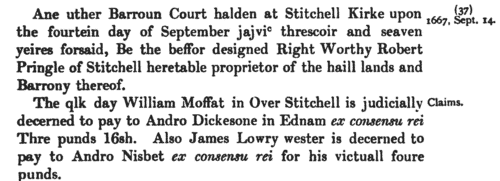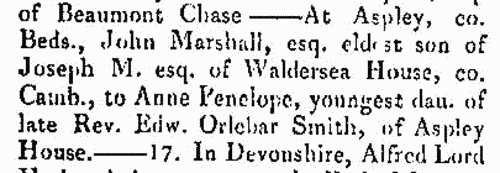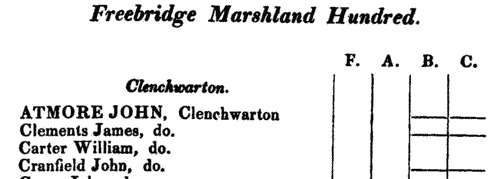Add this eBook to your basket to receive access to all 103 records. Our indexes include entries for the spelling hogge. In the period you have requested, we have the following 103 records (displaying 51 to 60): These sample scans are from the original record. You will get scans of the full pages or articles where the surname you searched for has been found. Your web browser may prevent the sample windows from opening; in this case please change your browser settings to allow pop-up windows from this site. Deaths, Marriages, News and Promotions
(1771)
Death notices and obituaries, marriage and birth notices, civil and military promotions, clerical preferments, and bankrupts, as reported in the Gentleman's Magazine. Mostly from England and Wales, but items from Ireland, Scotland and abroad.
| Sample scan, click to enlarge

| Freemen of Canterbury by Redemption
(1392-1800)
No man or woman could trade in the city of Canterbury without having obtained 'freedom' of the city, unless they paid an annual fee to do so. Admissions of freemen were recorded on the Chamberlains' Accounts of the city, which were prepared annually from Lady Day (25 March) to Lady Day until 1752, and thereafter each set runs from 1 January to 31 December. The accounts for 1392 are incomplete, but thereafter until 1800 there is a complete series except for the years 1455 to 1457 and the year 1552-3. Joseph Meadows Cowper, Honorary Librarian to the Corporation, produced this extract of the names from 1392 to 1800, and the volume was privately printed in 1903. There are five groups of freemen: those who obtained freedom after serving out an apprenticeship to a freeman; the children of freemen; those who married a freeman's daughter; those who claimed freedom by 'redemption', i. e. by purchase; and those who were honoured by a gift of the freedom from the Mayor and Court of Aldermen. Cowper published his lists divided into the five categories: the sample scan is from the list of those who obtained freedom by marriage. This is the index to those who gained their freedom by redemption. | Sample scan, click to enlarge

| Wives and Masters of Freemen of Canterbury
(1392-1800)
No man or woman could trade in the city of Canterbury without having obtained 'freedom' of the city, unless they paid an annual fee to do so. Admissions of freemen were recorded on the Chamberlains' Accounts of the city, which were prepared annually from Lady Day (25 March) to Lady Day until 1752, and thereafter each set runs from 1 January to 31 December. The accounts for 1392 are incomplete, but thereafter until 1800 there is a complete series except for the years 1455 to 1457 and the year 1552-3. Joseph Meadows Cowper, Honorary Librarian to the Corporation, produced this extract of the names from 1392 to 1800, and the volume was privately printed in 1903. There are five groups of freemen: those who obtained freedom after serving out an apprenticeship to a freeman; the children of freemen; those who married a freeman's daughter; those who claimed freedom by 'redemption', i. e. by purchase; and those who were honoured by a gift of the freedom from the Mayor and Court of Aldermen. Cowper published his lists divided into the five categories: the sample scan is from the list of those who obtained freedom by marriage. This is the index to all the stray names in the records: the wives and father-in-laws by whom freedom was acquired; the masters of apprentices; and other persons mentioned by the way in the record. | Sample scan, click to enlarge

| Tradesmen of Chester
(1392-1805)
Lists of admissions of freemen of the city of Chester from the earliest surviving records to 1805 were compiled by J. H. E. Bennett and published by the Lancashire and Cheshire Record Society from 1906. These lists were extracted from the mayoral yearbooks (dating back to 1392) and twelve freemen's rolls covering 1538 to 1612 and 1636 to 1805; and a list of admissions for 1505-1506 in Harleian MS 2105 (British Library). The record does not become more or less continuous until about 1490: in all, 12,426 freedoms are recorded. Freedom of the city, necessary to practise a trade in the city, could be obtained by birth (in which case the father's name and occupation are usually given); by apprenticeship to a freeman (the master's name and occupation being given); or by order of assembly. Both the freemen and the masters listed are indexed here. The main abbreviations used are: B, freedom taken up by right of birth; I, freedom taken up by right of indenture; M. B., Mayor's Book; *, freedom granted by order of assembly. | Sample scan, click to enlarge

| Inhabitants of Stichill in Roxburghshire and Berwickshire
(1655-1807)
The minute book of the baron court of the parish of Stichill (Stitchill or Stichell) was transcribed by the Reverend George Gunn, rector of Stitchill and Hume, edited by Clement B. Gunn and printed by the Scottish Record Society in 1905. The court had jurisdiction throughout the baron over most matters of civil and criminal law, and the minutes of the court deal with personal disputes and the administration of the barony. | Sample scan, click to enlarge

| Deaths, Marriages, News and Promotions
(1828)
Death notices and obituaries, marriage and birth notices, civil and military promotions, clerical preferments and domestic occurrences, as reported in the Gentleman's Magazine. Mostly from England and Wales, but items from Ireland, Scotland and abroad.
| Sample scan, click to enlarge

| Deaths, Marriages, News and Promotions
(1831)
Death notices and obituaries, marriage and birth notices, civil and military promotions, clerical preferments and domestic occurrences, as reported in the Gentleman's Magazine. Mostly from England and Wales, but items from Ireland, Scotland and abroad.
| Sample scan, click to enlarge

| Tradesmen of Lynn in Norfolk
(1292-1836)
Lists of admissions of freemen of Lynn from the earliest surviving records to 1836 were published by the Norfolk and Norwich Archaeological Society in 1913. These lists were extracted from the tallage rolls of 1291 to 1306; the Red Register of Lynn from 1342 to 1395; from the assembly rolls for the reigns of Henry IV and V [1399 to 1422]; from the hall books from 1423; and from a list of freemen starting in 1443 in the Book of Oaths (but itself abstracted from entries in the hall books). Freedom of the borough, necessary to practise a trade there, could be obtained by birth (in which case the father's name and occupation are usually given); by apprenticeship to a freeman (the master's name and occupation being given); by gratuity; or by purchase. Both the freemen and the masters listed are indexed here. The main abbreviations used are: B., freedom taken up by right of birth; A., freedom taken up by right of apprenticeship; G., freedom granted by order of assembly (gratuity); and P., freedom acquired by purchase. | Sample scan, click to enlarge

| Deaths, Marriages, News and Promotions
(1837)
Death notices and obituaries, marriage and birth notices, civil and military promotions, clerical preferments and domestic occurrences, as reported in the Gentleman's Magazine. Mostly from England and Wales, but items from Ireland, Scotland and abroad.
| Sample scan, click to enlarge

| Voters in the Western Division of Norfolk, for the parish of King's Lynn St Margaret
(1837)
Under the Reform Act of 1832, the County of Norfolk was allotted four Members of Parliament, being two Knights of the Shire for the Eastern Division and two for the Western. The Western Division included the hundreds of Brothercross, Clackclose, Freebridge Lynn, Freebridge Marshland, Gallow, North Greenhoe, South Greenhow, Grimshoe, Guiltcross, Holt, Launditch, Mitford, Shropham, Smithdon and Wayland. Polling in 1837 took place at Swaffham, Downham, Fakenham, Lynn Regis, Thetford and East Dereham. The franchise was available to freeholders worth 40s a year or over; copyholders and long leaseholders of £10 or more; short leaseholders and tenants of £50 or more: but limited to adult males. Voting took place on 1 and 2 August 1837. This poll book lists the voters for each parish, with the votes cast. Each voter had two votes: the votes are indicated in the columns F. (Sir William Henry Browne Folkes, 2838); A. (Sir Jacob Astley, 2713); B. (William Bagge, 3178); and C. (William Lyde Wiggett Chute, 2877). The voters were not necessarily resident in the parish, but derived their franchise from the land there; so some of the names have addresses outside the parish, not a few living in different counties. Not everyone voted, but everyone with a vote was listed in the poll book: persons who qualified for voting in two parishes (but nevertheless had just the one vote per person) are noted as such. | Sample scan, click to enlarge

|
Research your ancestry, family history, genealogy and one-name study by direct access to original records and archives indexed by surname.
|











